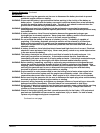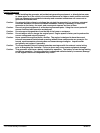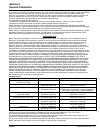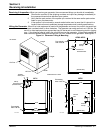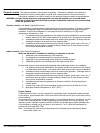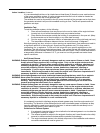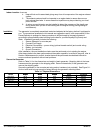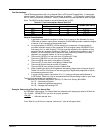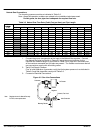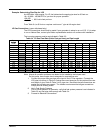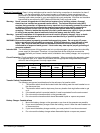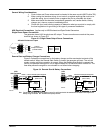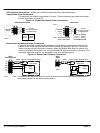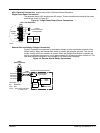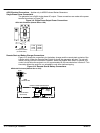
Receiving & Installation 3-5MN2415
Fuel Connections
The AE Series generators will run on Natural Gas or LPG (Liquid Propane Gas). If natural gas
supply is used, follow the “Natural Gas Connections” procedure. If LPG supply is used, follow
the “LP Gas Connections” procedure. Table 3-2 defines the flow rate required for each fuel type.
Note: The AE25 must be ordered for use with Natural gas or LPG.
Table 3-2 Fuel Consumption Natural and LPG
Generator Model Required Flow Rate (cubic feet per hour) Pressure
(ih t l )
Natural Gas LPG
oz. (inches water column)
AE8 160 64 6 oz (11)
AE10 200 72 6 oz (11)
AE11 200 72 4 oz. (7)
AE25 400 159 6 oz (11)
General Considerations
1. A generator set needs the engine to deliver 2 hp of energy to the alternator for every
1000 watts of electric output power (example: an 8000 watt generator needs the engine
to deliver 16 hp of energy to the generator end).
2. An engine needs 10,000 BTU’s of fuel energy per horsepower of engine power to
provide a sufficient supply of fuel (example: a 16 Hp engine needs 160,000 BTU’s of
fuel energy for it to work properly). This fuel must be supplied to the regulator on the
generator set at a pressure indicated in Table 3-2. To achieve this pressure in an L.P.
System, you will normally have to reduce the tank pressure by means of a primary
regulator or a regulator system of 2 or more regulators.
3. There are 2,516 BTU’s in one cubic foot of Propane (LP Fuel).
There are 1,096 BTU’s in one cubic foot of Natural Gas.
4. There are 36.39 cubic feet in one gallon of Propane.
There are 57.75 cubic feet in one gallon of Natural Gas.
5. There are 8.58 cubic feet per pound of Propane.
There are 23.56 cubic feet per pound of Natural Gas.
6. When installing the piping for the gaseous fuel supply please refer to the pipe chart in
Tables 3-3 and 3-4 to be sure you are using piping of significantly large size to deliver
the necessary amount of fuel.
7. If copper tubing is used, it should be “K” or “L” having a minimum wall thickness of
0.032 inches. Black Iron Pipe is recommended but follow building codes for your area.
The following pamphlets are available from:
National Fire Protection Association (NFPA) P.O. Box 9101 Quincy, MA 02269
No. 37 − Combustion Engines
No. 54 − Gaseous Appliances and piping
No. 58 − Storage and handling LPG
Example: Determining Pipe Size for Natural Gas
An AE8 has a 16Hp engine. For Natural Gas fuel, determine the supply pipe size for 60 feet run.
16 x 10,000 = 160,000 BTU’s / per hour for proper operation.
160, 000
1, 096
+ 146 cubic feet per hour.
From Table 3-4, a 60 foot run requires a minimum 1” pipe at full engine load.



